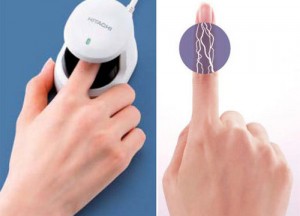x
- More +
Hitachi and MIG introduce mobile Wi-Fi biometric scanners in Turkish hospitals – Jul 11, 2014– Istanbul, Turkey (Techreleased) – Hitachi Europe Ltd., a subsidiary of Hitachi, Ltd. and MIG Int., today announced a roll-out of mobile Wi-Fi scanners that offer convenient mobile identification for the patient at the point of care. The ‘BIOMIG’ device, based on […]
BY Editor
Posted On July 11, 2014
Hitachi and MIG introduce mobile Wi-Fi biometric scanners in Turkish hospitals – Jul 11, 2014– Istanbul, Turkey (Techreleased) – Hitachi Europe Ltd., a subsidiary of Hitachi, Ltd. and MIG Int., today announced a roll-out of mobile Wi-Fi scanners that offer convenient mobile identification for the patient at the point of care. The ‘BIOMIG’ device, based on Hitachi’s finger vein authentication technology, has been introduced at several individual private hospitals, hospital groups and dialysis centres in Turkey as well as the Memorial Healthcare Group.
This is part of a much broader adoption of biometric technology in Turkey. Since 2012, the SGK (Social Security Institution of Turkey) has been implementing a system to better manage healthcare services in the country. To combat abuse and inefficiencies in the existing healthcare payments system, the institution introduced biometric identification for patients.
The implementation was required to ensure correct allocation of services. Turkey has a scheme known as Universal Health Insurance (UHI) under which employees pay compulsory regular contributions towards the Government health care fund. There are arrangements to cover benefits for all types of workers, and access to services for those on an income below the level defined by the law, which was previously based on a “green card” system, with the special cards being issued by the Ministry of Health in Turkey. The green card provided free access to services at a range of hospitals and more than 10 million were previously issued. It has now been withdrawn and benefits for citizens on such incomes are managed under the UHI scheme but expenditure has far exceeded expectations leading to big gaps in the healthcare budget, putting financial strain on the Turkish government.
The biometric solution, used by patients at the point of service, allows the government to manage reimbursements to service providers in a far more efficient manner. The introduction of mobile Wi-Fi scanners that offer convenient mobile identification for the patient at the point of care is the latest development in the progression of biometric identification in Turkish hospitals.
Erman Akgün, Country Manager for Turkey, Hitachi Europe Ltd., commented on the development, “MIG has been implementing one of the biggest biometrics projects in Turkey and Europe and has translated its experience in reliability and ergonomics to the healthcare industry by way of its BIOMIG device.”
Yener Güçkıran, Head of Sales for Healthcare of MIG Int., said, “With the inclusion of university hospitals in the biometric authentication system, a market of around TRY 10.000.000 emerged. Our aim is to capture 75% of this market. In this dynamic, ambitious and rapidly growing market BIOMIG stands out with its technology, speed, reliability and convenience.”
Finger vein technology, as opposed to other identification methods, provides the level of watertight security required. Finger print, facial scanning and voice authentication are all based on external features that can be recorded without the individual being aware, which is at the root of concern around credential theft. However, Hitachi’s finger vein authentication technology reads the pattern of the vein inside the finger, rather than external characteristics, making it very difficult to replicate. It is so technically difficult to capture the data in the first place without sophisticated technology, that the chance of cloning is extremely slim – particularly in comparison with traditional card or password methods of authentication.
Finger vein authentication offers an opportunity for other healthcare organisations and public sector organisations more generally to improve operations, reduce costs and stop the defrauding of systems.
Through these high security and reliability solutions, Hitachi and MIG continue working together to contribute to improve the quality of life in Turkey. Hitachi is committed to providing sophisticated solutions not only in Turkey but also other countries and regions worldwide to help solve society issues.
TechReleased is one of the leading source of technology information and a newspaper which is dedicated for technology news and releases, it is one of the few online sources that provides all the technology news from the globe.




